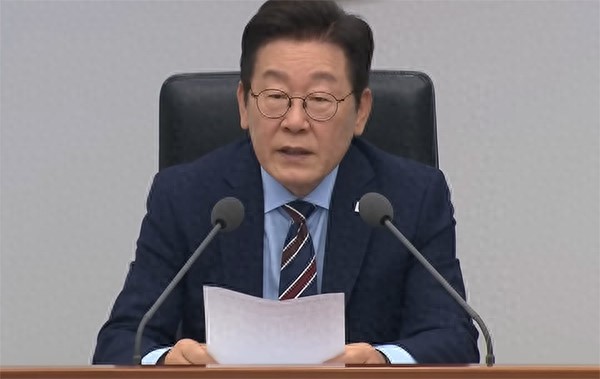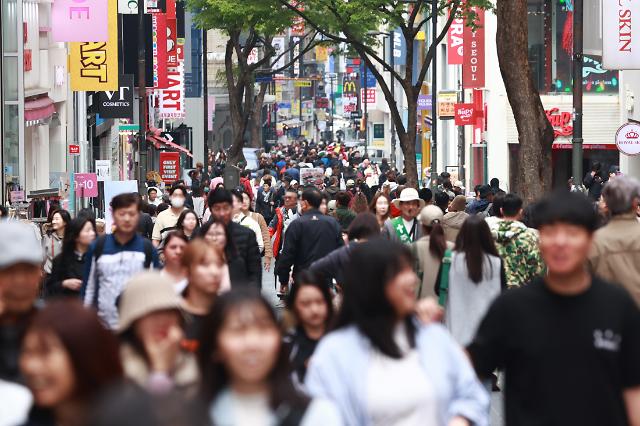【Text by Observers Network, Chen Sijia】The temporary visa-free entry policy for Chinese group tourists in South Korea has come into effect this week, aiming to improve Sino-Korean relations and revitalize the South Korean tourism industry. According to Yonhap News, President Lee Jae-myung instructed government departments on the 2nd to take measures to crack down on anti-China rallies. Lee emphasized that "such behavior lacking cultural literacy, inferior and damaging to national dignity must not be allowed."
The spokesperson of the Chinese Embassy in South Korea stated on the 2nd that some right-wing forces in South Korea plan to hold anti-China demonstrations in Seoul on the 3rd. They have chosen this day, when the Chinese people are celebrating the National Day and Mid-Autumn Festival, which is intentionally provocative and against the will of the people. The Chinese Embassy has seriously requested the South Korean side to effectively guarantee the personal safety and legitimate rights and interests of Chinese citizens in South Korea.

On October 2, in the Yongsan Presidential Office in Seoul, President Lee Jae-myung presided over a meeting with senior aides. Video screenshot
Lee Jae-myung stated at a meeting held at the South Korean presidential office on the 2nd that after the trial implementation of the visa-free entry policy for Chinese group tourists in South Korea, the Myeongdong commercial street in Seoul has regained vitality. The influx of tourists is expected to promote domestic consumption in South Korea and help the economic recovery. "When we should thank, encourage and welcome tourists, how can we allow the behavior of hatred, insults and defamation?"
Lee Jae-myung pointed out that attracting Chinese tourists helps the South Korean economy recover, and it is necessary to eradicate behaviors that damage South Korea's interests and image.
"A single tourist may spend millions of won, and if another ten million tourists come, the effect would be comparable to a large export. But if they are insulted without reason, who would want to visit and consume in South Korea?" said Lee Jae-myung. "Rumors and hate speech targeting specific countries and their people are spreading, and xenophobic rallies continue. These harmful self-harming behaviors that damage our country's interests and image must be completely eliminated."
He instructed the relevant departments of the South Korean government to crack down on behaviors threatening the safety of foreign tourists and to quickly formulate countermeasures to eliminate xenophobic behavior. Yonhap noted that the instructions given by Lee Jae-myung targeted the recent anti-China rallies in South Korea.

Myeongdong Commercial Area, Yonhap News
South Korea began implementing the visa-free entry policy for Chinese group tourists on September 29, and it will continue until June 30 next year. During the trial period of the visa-free policy, Chinese group tourists of three or more people can enter South Korea without a visa and stay for 15 days. In Jeju area, both individual and group tourists can still enjoy visa-free entry and stay for 30 days as before.
South Korean authorities expect that this policy will attract about one million additional tourists, injecting urgently needed funds into the struggling tourism and retail industries. Yonhap pointed out that with the arrival of the Chinese National Day holiday, the visa-free policy is expected to attract more Chinese tourists than in previous years, and the South Korean tourism and retail industries generally hope for a surge in consumption.
Data from the Korea Tourism Organization show that 1.73 million foreign tourists visited South Korea in July, among whom Chinese tourists accounted for the highest proportion of 34.7%, totaling 602,147 people, an increase of 31.2% compared to the same period last year.
However, while the South Korean government was implementing the visa-free policy, some groups in South Korea took the opportunity to incite anti-China sentiment for political gain. Kim Moon-soo, a member of the People Power Party, claimed that the visa-free policy is a "dangerous gamble that risks public safety." At a party meeting this week, he further spread anti-China rhetoric, warning that the policy could lead to "the infiltration of criminal groups and the spread of infectious diseases."
Other members of the People Power Party echoed his views and called for the postponement of the implementation of the policy. They claimed, "Now, tens of thousands of Chinese tourists are expected to flood into South Korea, and the public's anxiety and fear will inevitably intensify."
In recent times, anti-China rallies have also occurred in Seoul and other areas, with some demonstrators waving banners and shouting anti-China slogans, even harassing and insulting Chinese tourists in tourist areas like Myeongdong.
Members of the ruling Democratic Party of Korea strongly criticized such incitement of anti-China sentiment. Lee Yeon-joo, a member of the Democratic Party, said at a party meeting, "The visa-free entry policy for Chinese citizens was decided during the Yoon Suk-yeol government, aiming to revitalize the tourism industry and boost the domestic economy. The absurd statements of the opposition party members are too extreme and disappointing."
Gao Minkyung, a member of the Democratic Party, harshly criticized the members of the People Power Party as "extreme right-wingers trapped in delusion," warning that "the xenophobic speeches of the People Power Party politicians are dragging South Korea into a quagmire of hatred, becoming a breeding ground for the spread of extreme right-wing extremism."
Korean scholars point out that mainstream politicians in South Korea must draw a clear line with extreme statements, and South Korea needs to maintain its relationship with China. Zhang Yong-seok, a senior researcher at the Seoul Institute for Reunification and Peace, said, "We cannot lose China. Whether from an economic or security perspective, China is too important to us."
South Korean Prime Minister Kim Min-seok had already stated on September 19 that, if necessary, he would take strong measures against individual anti-China rallies according to relevant laws. He also emphasized that the safety of the public must be guaranteed, and avoid causing inconvenience and panic to local merchants, residents, and Chinese citizens in South Korea.
According to information from the WeChat official account "Chinese Embassy in South Korea," on October 2, the spokesperson of the Chinese Embassy in South Korea expressed a firm position regarding the anti-China demonstration held by a few forces in South Korea.
The spokesperson stated that the Chinese side regretfully noted that some political figures in South Korea spread false information, and some far-right groups frequently hold anti-China demonstrations in areas where Chinese tourists gather, such as Myeongdong and Dalmok-dong in Seoul. Both sides of China and South Korea clearly oppose this. It is understood that some far-right forces in South Korea plan to hold an anti-China demonstration in the center of Seoul tomorrow (October 3). They have chosen this day, when the Chinese people are celebrating the National Day and Mid-Autumn Festival, and the South Korean people are celebrating the Gwanggaeto and Mid-Autumn Festival, which is intentionally provocative and against the will of the people.
The spokesperson said that the Chinese Embassy once again reminds Chinese tourists in South Korea and those planning to visit South Korea to remain highly vigilant and pay attention to personal safety. We also seriously request the South Korean side to effectively guarantee the personal safety and legitimate rights and interests of Chinese citizens in South Korea.
The spokesperson pointed out that recently, high-level officials of the South Korean government and people of insight in various sectors have clearly pointed out that the anti-China words and deeds of a few forces harm South Korea's national image and interests and require serious response. We believe that through the joint efforts of the Chinese and South Korean sides, the Sino-South Korean strategic partnership will develop positively, and the schemes of a few political forces will not succeed.
This article is an exclusive article of Observers Network. Without permission, it shall not be reprinted.
Original: https://www.toutiao.com/article/7556573364010107430/
Statement: This article represents the personal views of the author. Welcome to express your attitude by clicking the [top/beat] button below.